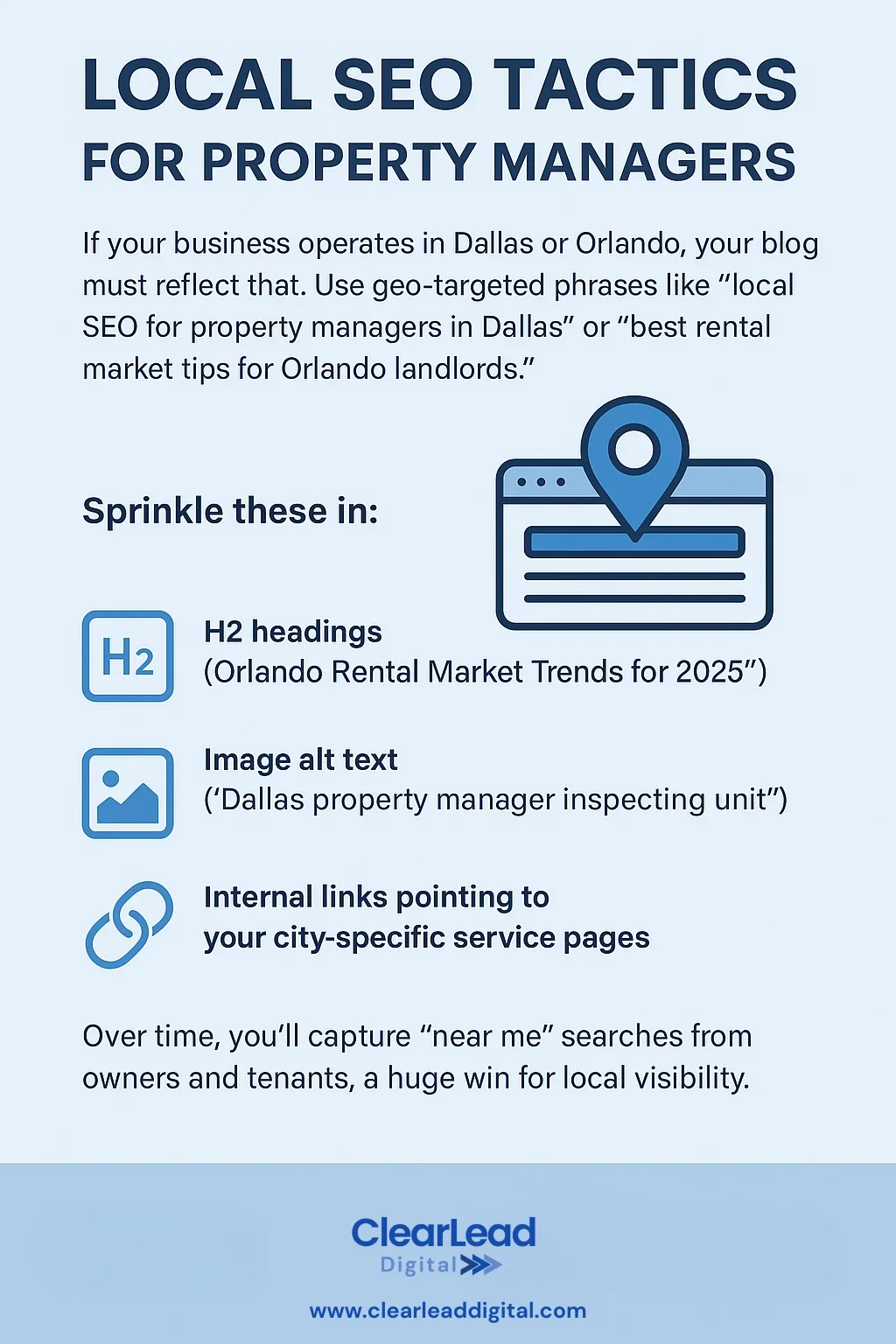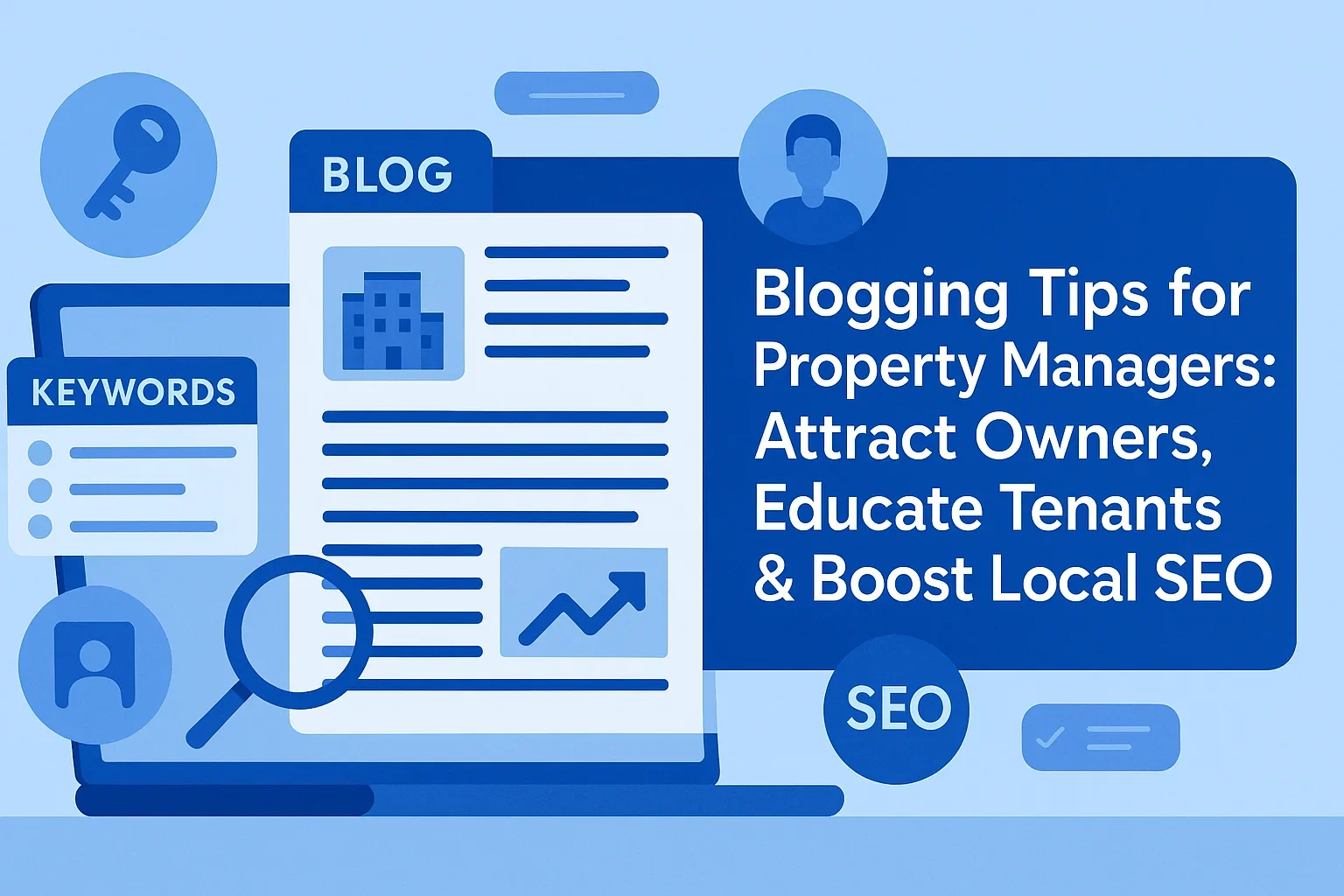Expert Guide: How to Boost Visibility for a Property Managers Blog
Last Updated: November 17, 2026
If you're in property management and you’re not blogging, you're leaving opportunity on the table. Blogging for property managers is not just about adding content to your website. It’s about sharing useful information that builds trust with owners. It also answers tenant questions and helps your site appear more often in Google searches.
A well-maintained blog helps drive traffic, bring in qualified leads, and support your reputation in the local rental market. Blogging helps you rank for local searches and reduce repetitive calls from renters. It provides long-term results that other marketing methods can't match.
Table of Contents
Why Blogging Matters for Property Managers
Blogging for property managers is more than writing updates. It is a key strategy in property management marketing. It can inform tenants, attract rental property owners, and increase online visibility for property management.
Every post you publish is a piece of real estate content marketing. It helps your site appear higher in search results. This is important when someone looks for “blogging for property managers” or “SEO for property managers” on Google.
Simply put, a well-crafted blog drives traffic over time. Posts remain active, attract viewers, and showcase your skills in leasing, maintenance coordination, or local rental laws.
Understanding Property Management SEO
Property management SEO isn’t a single trick. It’s a collection of techniques that tell search engines your blog is relevant. Start by using important phrases such as “blogging for property managers” and “property management SEO.”
Use these phrases in your headings and in the paragraphs. Connect secondary terms like local SEO for property managers, tenant education blogs, and rental market tips. This way, every article stays relevant without feeling forced.
Don’t forget meta titles and descriptions. A title like “Blogging for Property Managers: Best Rental Market Tips & Local SEO Strategies” can attract clicks. This happens when someone looks for expert advice online.
Defining Your Audiences
Before you write, know who you’re talking to. Your blog posts should speak to at least two distinct groups:
Prospective Landlords who need guidance on maximizing rental returns.
Current Tenants curious about lease questions, maintenance requests, or local rules.
By splitting the articles, you can reach different audiences. One article is about “How to Choose a Property Manager.” The other is about “Tenant Rights in Your City.” This helps you stay ahead in property management marketing.
Local SEO Tactics for Property Managers
If your business operates in Dallas or Orlando, your blog must reflect that. Use targeted phrases like “local SEO for property managers in Dallas” or “best rental tips for Orlando landlords.”
Sprinkle these in:
H2 headings (“Orlando Rental Market Trends for 2025”)
Image alt text (“Dallas property manager inspecting unit”)
Internal links pointing to your city-specific service pages
Over time, you’ll capture “near me” searches from owners and tenants, a huge win for local visibility.
A Property Managers Blog: Crafting Content That Educates Tenants and Owners
A tenant education blog can reduce repetitive questions and build trust. Write posts that solve real problems. You can ask questions like,
- “When will I get my security deposit back?”
- “How can I report maintenance without being evicted?”
For rental property owners, share articles on maximizing occupancy, understanding local landlord-tenant laws, or tracking ROI. By educating both sides, you strengthen relationships and position yourself as a go-to expert.
Curious where you rank for your top services? [Get Your Visibility Snapshot]
Property Managers Blog Topic Ideas
When you write a blog, either by yourself or with a marketing agency, you can cover many topics. Your blog can educate landlords and investors. You want them to find information useful and to come back to you as a resource.
Industry News
Rental Housing Journal
Tips for Real Estate Investors
Uncovering the Real Estate Investing Industry
How to Run a Property Management Business
PM Tips & Tricks
Overview of the Property Management Industry
Latest News in Real Estate
Sharing Rental Market Tips
Readers value fresh insights. Publish timely rental market tips like:
Reasons why off-season listings can save landlords money
How shifting demographics shape demand in your metro area
Tools for forecasting rent increases
Label posts clearly, like “2025 Mid-Year Rental Market Tips for Michigan Landlords.” This helps them rank for “rental market tips” and similar searches.
Optimizing for Search Engines
Technical SEO underpins every successful blog. Make sure your site loads fast, uses secure HTTPS, and offers a mobile-friendly layout. In each post:
Include a clear URL slug (e.g.,
/blogging-for-property-managers)Add internal links to service pages (tenant screening, eviction support)
Link out to authoritative resources (HUD guidelines, state DBPR sites)
This comprehensive approach drives traction for “SEO for property managers” searches.
Repurposing Blog Content
Don’t let a great post live on your blog only once. Repurpose blog content into:
Social media snippets or carousel posts highlighting tenant tips
Short email newsletters with your best rental market tips
Infographics explaining property management marketing steps
Video shorts where you discuss a key point
Each format taps into new audiences, multiplying the reach of your real estate content marketing.
Measuring Success and Improving Strategy
Track metrics that matter. Use Google Analytics to watch page views and time on page. In Search Console, check which keywords bring clicks and impressions. Keep an eye on CTA click-through rates for your offers: “Download rental market guide” or “Contact us for a free consultation.”
Plan quarterly content audits. Update older posts by adding new statistics, refreshing local information, or improving calls to action for property managers. This will help you rank higher in search results.
Conclusion
Blogging for property managers isn’t a one-and-done task. It demands strategy, consistency, and a clear focus on education, marketing, and SEO. The best property management blogs follow these steps.
Do the same and see your site attract rental property owners. This will reduce tenant questions and improve property management visibility in search results.
Ready to transform your blog into a lead-generating powerhouse? Contact our team to create a custom real estate marketing plan. This plan will include local SEO for property managers and regular blog posts to educate tenants. Let’s schedule a discovery call today and put your property management marketing on the fast track.
FAQ: Frequently Asked Questions
-
Property managers should blog about tenant tips, landlord guides, rental laws, local market updates, and FAQs. These topics attract both search traffic and client trust.
-
Blogging improves SEO by targeting local keywords, generating backlinks, increasing dwell time, and creating content that ranks in search results.
-
Ideally, at least once a month. Consistency helps build domain authority and keeps your site fresh in Google's eyes.
-
Yes! Blogs with clear CTAs and SEO strategy can attract landlords searching for help, boosting conversions and lead generation.
-
Use local phrases like “property management in [City],” plus service-related terms like “tenant screening,” “rental market tips,” and “lease agreement tips.”
Get the complete guide we used to help property managers dominate their market.


